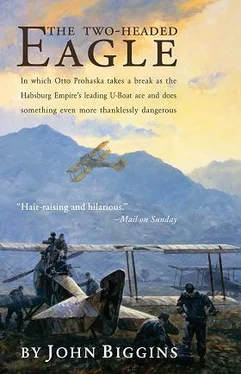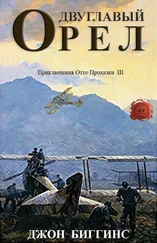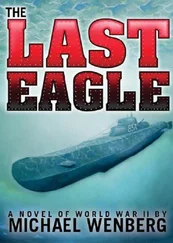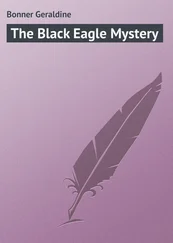I could scarcely believe my eyes. Here indeed was something far more worthy of our attention than the place where a target had once been. Toth needed no order from me to turn and give full throttle. It was an Italian airship, strolling towards the lines above Monfalcone. It was about six kilometres away, and (I thought) about a thousand metres above us. That would mean at least eight minutes of climbing around in circles before we could reach him, not to speak of closing the distance. Still, it seemed worth a try. Airships were a matter of some interest to me that summer. I had won my Maria Theresa in part for having shot down just such an Italian semi-rigid, south of Venice in July. They were not very large airships as such contraptions go: certainly nothing to compare with the German Zeppelins. The gasbag was a single, soft envelope and rigidity was given by a long V-sectioned keel of aluminium girders from which the engines and control gondolas were suspended. The Italians had built quite a number of these airships—the larger ones had a crew of nine or ten—and had been trying for the past year to use them on bombing-raids, with conspicuous lack of success. And here was one of them now, insolently flaunting its toad-like, pale-yellow bulk over the countryside in broad daylight. Such effrontery could not go unanswered.
The only trouble was, I realised as we climbed up towards the airship, that apart from my Mannlicher carbine and five clips of ammunition we had no means of attacking the airship short of ramming it. As for the Italians, they were quite well equipped to defend themselves. There seemed to be a machine gun in each of the crew gondolas, to judge by the streams of tracer that sprayed out at us like water from a garden hose each time we tried to manoeuvre within range. The one great advantage of an airship over an aeroplane in those days was the former’s ability to climb. An aeroplane had to labour round in circles for six or seven minutes to gain a thousand metres, whereas all that an airship had to do was to release water ballast and whee! up it would go like a witch on a broomstick. But for some reason which I shall never understand the Italians neglected to escape that way, only continued at the same height and allowed us to climb above them—where we saw to our delight that there was no machine-gun position on the top of the gasbag.
So we circled for a while, like Red Indians around a settler’s wagon, as I fired off our entire stock of ammunition into the airship’s envelope. It had no visible effect though. I suppose that, like me that morning, you have some mental picture of the airship going pop! at the first hit, like a child’s balloon pricked with a pin. Well, forget it: the pressure of the gas in an airship’s envelope is not in fact much above that of the surrounding air, and the seepage of hydrogen from a few puny rifle-bullet holes could probably have gone on for days before the thing even began to lose its shape. As we climbed away from our last futile pass, followed by a valedictory spatter of fire from the forward gondola, I looked around desperately for some other means of attack. Then an idea struck me: the wireless set. It weighed forty kilograms and, although it left much to be desired from an aerodynamic point of view, it had lots of jagged edges and sharp corners. Feverishly I got to work wrenching out wires and disconnecting the demolition charge as Toth turned to make another pass at the airship. He seemed to sense what I wanted, and took us roaring in a shallow dive along the airship’s swelling, pig-like back.
I almost ruptured myself as I lugged the wireless set on to the cockpit coaming, struggling to hold it steady in the howling slipstream, then heaved it into space at what I judged to be the correct moment. The aeroplane skipped and lurched, relieved suddenly of the weight, and it was several seconds before Toth could steady her enough for us to come around and survey the results—if any—of our unorthodox bombing attack. We saw that the wireless set had almost missed the airship as it plummeted past. Almost, but not quite: a large rent about two metres long had been torn in the fabric about a third of the way forward from the tail. The envelope was already beginning to sag and billow slightly as we watched, circling above. As for the Italians, they had clearly realised that something was wrong and were trying to turn around and get back across their own lines before they crashed. But to no avail: a rapidly deflating airship is almost impossible to steer, and in any case a south-west breeze had sprung up. Try as they might, they were being blown deeper and deeper into Austrian territory, losing height as they went. Meanwhile we circled above like a buzzard, waiting to see where our victim would come down.
In the end, twenty minutes later, the airship hit the ground way behind the lines, some distance outside the hamlet of Logavec, a Carso settlement so remote that no one had even bothered to transliterate its name into Italian. The crash was a prolonged and untidy business. The airship draggled along the ground like a wounded partridge for a good kilometre, leaving bits behind on stone walls and thickets, before what was left of it fetched up among the buildings of a farm, the envelope and broken keel finally draping themselves across the roof of a stone cottage. We circled above, looking for somewhere to land. A larger-than-usual dolina lay near by, about two hundred metres long and level from years of culivation. So we decided to chance a landing, despite the demolition charge which we were still carrying. Toth brought the Lloyd to a stop only a couple of metres in front of the steep, rocky end of the hollow and we leapt out to scramble towards the farm, intent on capturing the survivors before they could sort themselves out after the crash.
I carried the empty carbine and Toth his Steyr pistol. They were not a great deal of use, but at least I thought that we might menace the Italians into surrendering quietly if they were still disentangling themselves from the wreckage. But we were too late. I stuck my head up over a drystone wall to get a look at the wreck—and was obliged to pull it down again smartly as a burst of machine-gun fire rattled and whined off the rocks. The Italians had barricaded themselves into a stone outbuilding, carrying the airship’s weapons with them. No doubt they hoped to hold out until nightfall and then slip away unobserved. The front to northwards of Gorz, among the forests of the Bainsizza, was much less densely manned than the Carso sector, and anyway there were more than enough ethnic Italians in these parts to provide them with shelter and civilian clothes. Troops would reach us eventually—the entire Isonzo Front must have watched the airship coming down—but they would take time to find us. Clearly, our task was to hold the Italians where they were until reinforcements arrived.
I crept round as close as I dared to the outbuilding where the airmen were hiding and called out to them. Lucky, I thought, that four years at the k.u.k. Marine Akademie had made me fluent in Italian. The reply was another short burst of fire, aimed at random as far as I could make out. I tried again.
“Friends . . .” I paused, awaiting more shots. But none came. I went on, “Friends, Italian aviators, we mean you no harm.” There was a single shot, but I went on regardless. “Please see sense: you are now deep in Austrian territory after being brought down in a fair combat with no dishonour to yourselves. You have done everything that your country could reasonably expect of you and you must not sacrifice your lives in so futile a fashion after surviving a crash. You are now surrounded and heavily outnumbered . . .” (I have to add that I choked a little at this whopper), “so please be reasonable and surrender. You will be treated with every courtesy and in strict accordance with the Hague Convention and the laws of war: I myself promise you this upon my honour as an officer of the House of Austria.”
Читать дальше












